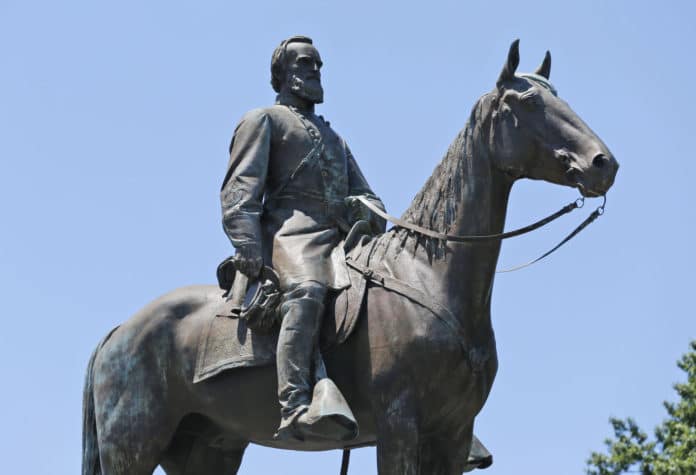Were it not a shame! Were it not a shame! World War II Monuments Men! Where are you? Mad benighted hatemonger vandals are abroad in the land desecrating and destroying historical monuments that have stood for 150 years. Thomas J. “Stonewall” Jackson and Robert E. Lee are the latest to have felt their rage and fury. What kind of men were Jackson and Lee?
Here’s what John Greenleaf Whittier had to say about Stonewall in his poem Barbara Frietchie:
Up the street came the rebel tread,
Stonewall Jackson riding ahead.
Under his slouch hat left and right
He glanced: the old flag met his sight.
“Halt!” – the dust-brown ranks stood fast;
“Fire!” – out blazed the rifle blast.
It shivered the window, pane and sash;
It rent the banner with seam and gash.
Quick as the flag fell from the broken staff
Dame Barbara snatched the silken scarf;
She leaned far out on the window sill,
And shook it forth with a royal will.
“Shoot if you must this old gray head,
But spare your country’s flag,” she said.
A shade of sadness, a blush of shame,
Over the face of the leader came;
The nobler nature within him stirred
To life at that woman’s deed and word:
“Who touches a hair of yon gray head
Dies like a dog! March on!” he said.
When Stonewall died after being wounded by friendly fire in May, 1863, legend has it that his last words were, “Let us cross over the river and rest under the shade of the trees.” Upon being apprised of Stonewall’s death, Lee said, “I have lost my good right arm.”
And what about Robert E. Lee? From Compton’s Encyclopedia, we read that “he was born in Stratford, Westmoreland County, Virginia, but the family soon moved to Alexandria on the Potomac near Washington. His father was “Light-Horse Harry” Lee, of Revolutionary fame, and his grandfather was first cousin to Richard Henry Lee, mover of the Declaration of Independence. He was graduated from West Point in 1829 without having received a single demerit.
“At 25 he married Mary Custis, great-granddaughter of Martha Washington and heiress of the beautiful estate of Arlington, on the Potomac, opposite Washington, D.C. To birth, wealth, a cultivated mind, courtly manners, a fine physique and handsome face were added personal happiness and eminence in his profession. As Assistant Chief Engineer of the army in the Mexican War he won distinction; as Superintendent of West Point in the 1850s, he introduced the best methods known in Europe. General Winfield Scott, head of the national forces, looked upon Lee as his most probable successor. In April 1861, President Lincoln offered him the command of the United States forces.
“In the very beginning of the United States government the question of the rival claims of states and the Union was a matter of debate. The South had generally advocated the principle of state sovereignty. Lee had already written, ‘I cannot anticipate a greater calamity for the country than the dissolution of the Union.’ But he was a Southerner, and he felt his first duty was to Virginia.
“Beautiful Arlington, his wife’s birthplace, his own home for 30 years, was lost immediately. It lay on the natural line of defense of the capital and became the first camping ground of the Northern army. His fortune was lost when he resigned his commission and offered his services to the South. He was made one of the full generals of the Confederacy.”
In the 2012 movie Lincoln, the war is over. Lee rides up to Appomattox Court House to surrender. General Grant steps down from the porch and approaches vanquished Lee astride his horse. The victor removes his cap. A picture is worth a thousand words.
In 1852, in entering his own son at West Point, Lee said to him: “Duty is the sublimest word in the language; you cannot do more than your duty; you should never wish to do less.”
What manner of hate abides in the hearts of those who tear down and spit on these historical monuments, a hate that launched a thousand chips and downed the dauntless statue of Robert E. Lee? Historians and lovers of art think these monuments erected by their ancestors have their place. Why kick a sleeping dog? Is it worth the controversy?
Don Woodard is a Fort Worth businessman and author of Black Diamonds! Black Gold! The Saga of Texas Pacific Coal and Oil Company.






